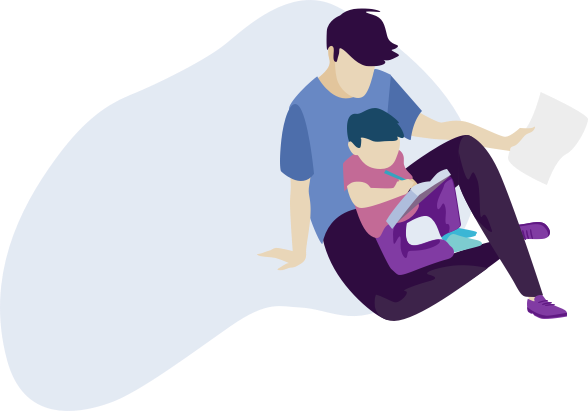

There is no one way to help your child or teen cope following trauma. Here you will find some steps you can take based on what research says works.
Including:
In the resources section you can find printer-friendly 2-page tip sheets on supporting your younger child and on supporting your older child or teenager.
The advice here is for managing lower levels of distress. If your child or teenager is extremely distressed and is struggling to cope, you may need to seek professional guidance and help.
Some children will want to talk a lot about what they went through. Others may avoid talking about the trauma altogether. You may be nervous about speaking to your child or teen about what happened. But giving them a chance to open up can be helpful.
Sometimes parents might avoid talking to their child about what they experienced, because they are worried about upsetting them. But creating space to talk about what happened can be a useful way to help them overcome their distress, even if it is difficult at first.
If your child wants to talk about the trauma it is a good idea to let them. Avoiding talking can send the wrong message. Your child may think they shouldn’t talk about what happened. Or they may imagine that it was too awful to talk about. Don’t just wait for your child to come to you. Make it clear that it is okay to talk and try to be open and available. That way your child understands that the trauma is something that they can talk about with you.
It may take time for your child to open up about their experience. Some children may not know how to start. Others may not yet be ready to talk for their own reasons. If this is the case it is okay to ask your child how they are feeling and let them know it is fine to talk when they would like to.
When talking to your child try to use questions they can’t answer with a straight ‘Yes’ or ‘No.’ These ‘open questions’ can get them talking and help you understand their point of view.
Here are some examples:
As well as asking about the event itself, it’s a good idea to ask questions that help you to find out more about how your child is coping.
Try not to judge your child’s actions or feelings. Focus on asking and listening.
There is no one answer to this question. Sometimes it can be helpful to include conversations about the trauma in your everyday chats with your child. This can mean that they feel less ‘put on the spot’. Some children and teens are also more comfortable talking at particular times, such as while in the car or shopping together. For other families making time specifically to talk things through may feel like the right way.
The main thing is to be there and to listen. However, after a bad experience, it is quite common for children to feel more vulnerable, changed for the worse in some way, or as if the world is more dangerous than before.
You can help by:
If your child or you become really distressed, emphasize that it is okay to feel upset but this does not mean they or you will feel this way forever. Try to stay together and talk until you are both feeling OK, rather than stopping or avoiding the conversation.
Remember we don’t expect you to be a therapist. If your child seems overwhelmed by their distress, it can help to seek support. Contact your GP if you are worried about your child’s reactions or feel you could do with professional help.
This is quite common, so try not to be offended. Some children or teens choose not to talk about the traumatic experience because they don’t want to upset parents. Some, who are coping well, may simply not want to go over it again. Others are not yet ready to talk. If this applies to your child, ask them how they are feeling and make sure they know you are there when they do feel able to open up.
You may find yourself asking your child or teen questions but getting little or nothing back. Again this is common. Continue to ask open questions and remind your child that you are available and ready to listen when they are ready.
If your child finds talking about what happened too difficult you cannot—and should not—force them. Instead, you could:
If they are really struggling, consider seeking professional advice.


For many children helping them get back to their usual routine and activities is the right thing to do. But bear in mind that it can take a while for life to return to normal.
Some children or teens may want to avoid going to places that remind them of their experiences. You can work with your child to overcome their fears, so they begin to feel more in control.
Click here for examples of how to help your child face their fears.
You may feel you are being kind or protecting your child by allowing them to avoid certain things—for example, talking about the trauma or going to school. However, this can reinforce the idea that they are not safe and make things harder in the long run. Evidence shows that it is better to encourage them to face their fears, if it is safe for them to do so.
It is different for every child. If they were physically injured, you may have to wait until they are well enough to get back to their normal activities before you go ahead. It is also a good idea to wait a few weeks to allow your child to get to grips with what has happened in their own way. You could start talking about what happened in the meantime and find out how your child feels about it. Talking about their experience is part of supporting them to face their fears.
It is best to approach things gradually step-by-step:
It’s normal—and okay—for your child to feel scared at first. The purpose of helping them face their fears is for them to learn that distress lessens over time. Once they start to see what they can achieve and realize that they can be safe things should become easier. Be prepared for ups and downs- sometimes it may seem like you take a step backwards. Be patient, and keep focused on what you have achieved.
No, it’s not a good idea to pressure your child as they need to feel in control. Talk with your child about their goals making sure they feel they are manageable. Then work out how to reach them using the step-by-step approach previously described. If it seems too hard, look for help.

This advice is for managing lower levels of distress. If your child or teenager is extremely distressed by what has happened, you may need to seek some professional guidance and help.